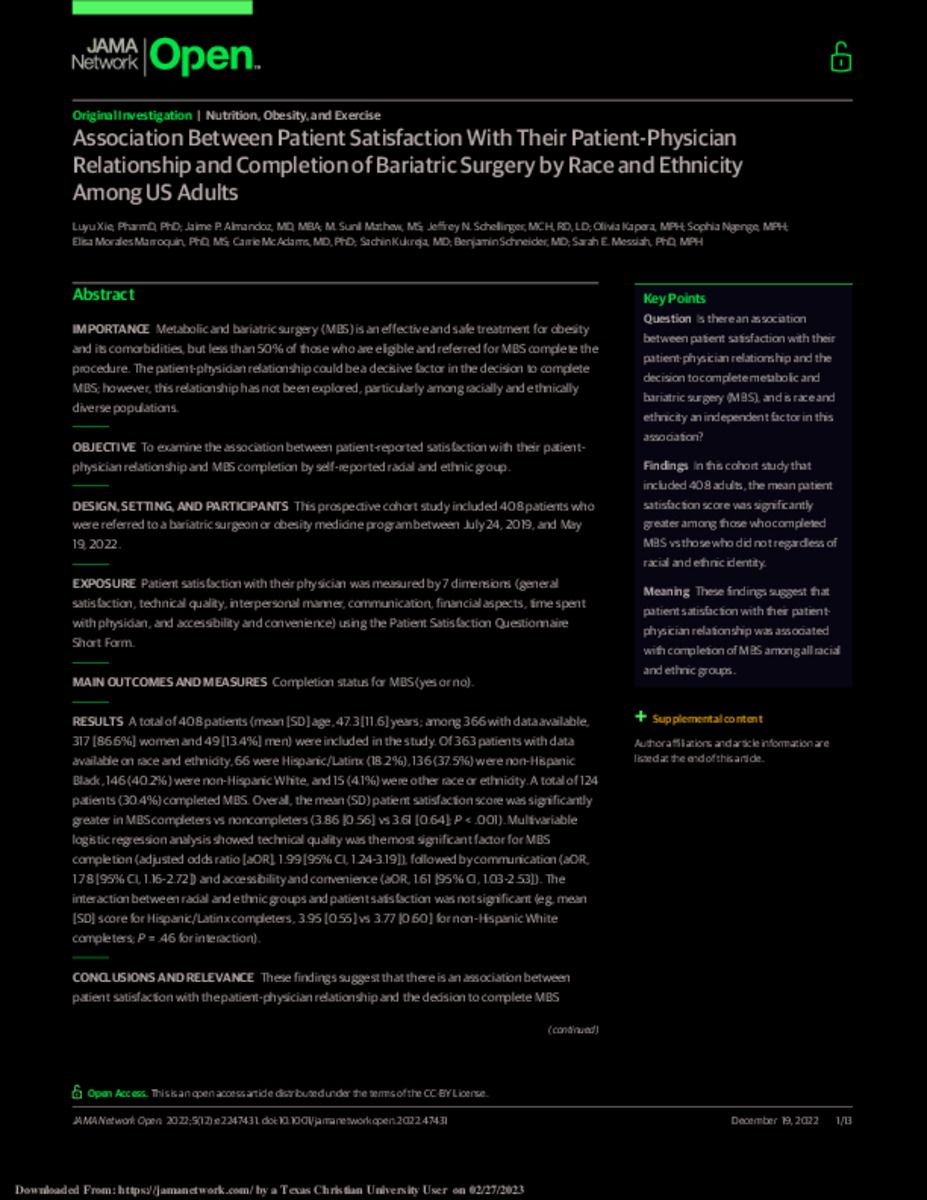Association Between Patient Satisfaction With Their Patient-Physician Relationship and Completion of Bariatric Surgery by Race and Ethnicity Among US AdultsShow full item record
| Title | Association Between Patient Satisfaction With Their Patient-Physician Relationship and Completion of Bariatric Surgery by Race and Ethnicity Among US Adults |
|---|---|
| Author | Xie, Luyu; Almandoz, Jaime P.; Mathew, M. Sunil; Schellinger, Jeffrey N.; Kapera, Olivia; Ngenge, Sophia; Marroquin, Elisa Morales; McAdams, Carrie; Kukreja, Sachin; Schneider, Benjamin; Messiah, Sarah E. |
| Date | 2022 |
| Abstract | Importance: Metabolic and bariatric surgery (MBS) is an effective and safe treatment for obesity and its comorbidities, but less than 50% of those who are eligible and referred for MBS complete the procedure. The patient-physician relationship could be a decisive factor in the decision to complete MBS; however, this relationship has not been explored, particularly among racially and ethnically diverse populations. Objective: To examine the association between patient-reported satisfaction with their patient-physician relationship and MBS completion by self-reported racial and ethnic group. Design, Setting, and Participants: This prospective cohort study included 408 patients who were referred to a bariatric surgeon or obesity medicine program between July 24, 2019, and May 19, 2022. Exposure: Patient satisfaction with their physician was measured by 7 dimensions (general satisfaction, technical quality, interpersonal manner, communication, financial aspects, time spent with physician, and accessibility and convenience) using the Patient Satisfaction Questionnaire Short Form. Main Outcomes and Measures: Completion status for MBS (yes or no). Results: A total of 408 patients (mean [SD] age, 47.3 [11.6] years; among 366 with data available, 317 [86.6%] women and 49 [13.4%] men) were included in the study. Of 363 patients with data available on race and ethnicity, 66 were Hispanic/Latinx (18.2%), 136 (37.5%) were non-Hispanic Black, 146 (40.2%) were non-Hispanic White, and 15 (4.1%) were other race or ethnicity. A total of 124 patients (30.4%) completed MBS. Overall, the mean (SD) patient satisfaction score was significantly greater in MBS completers vs noncompleters (3.86 [0.56] vs 3.61 [0.64]; P?<?.001). Multivariable logistic regression analysis showed technical quality was the most significant factor for MBS completion (adjusted odds ratio [aOR], 1.99 [95% CI, 1.24-3.19]), followed by communication (aOR, 1.78 [95% CI, 1.16-2.72]) and accessibility and convenience (aOR, 1.61 [95% CI, 1.03-2.53]). The interaction between racial and ethnic groups and patient satisfaction was not significant (eg, mean [SD] score for Hispanic/Latinx completers, 3.95 [0.55] vs 3.77 [0.60] for non-Hispanic White completers; P?=?.46 for interaction). Conclusions and Relevance: These findings suggest that there is an association between patient satisfaction with the patient-physician relationship and the decision to complete MBS regardless of race and ethnicity. These findings have important implications for strategies to improve the proportion of qualified patients who complete MBS to achieve improved health outcomes. |
| Link | https://doi.org/10.1001/jamanetworkopen.2022.47431
https://repository.tcu.edu/handle/116099117/57383 |
| Department | Nutritional Sciences |
| Subject | Adult
Bariatric surgery Ethnicity Female Humans Male Middle Aged Obesity Patient Satisfaction Prospective Studies Surgeons White People |
Files in this item
This item appears in the following Collection(s)
- Research Publications [1008]
Related items
Showing a few items related by title, author, creator and subject.
-
For patients who identify as LGBTQ+ in the DFW area, does having access to a LGBTQ+ health and community center and healthcare providers who are well-trained in LGBTQ+ health and wellness (and understand the need for specific and centered treatment in said patients) lead to stronger patient satisfaction, education, and health outcome in comparison to when those same patients visit general primary care physicians?
Garg, Vandana (5/1/2023)Research Question: For patients who identify as LGBTQ+ in the DFW area, does having access to a LGBTQ+ health and community center and healthcare providers who are well-trained in LGBTQ+ health and wellness (and understand ... -
Hope for Hispanic patients in the context of hospice: the impact of narratives of future oriented stories of hope in the experience of anticipatory grief for Hispanic Roman Catholic hospice patients in the Fort Worth area
Magana, Alberto O. (2012)Research shows that ethnic minorities access hospice care less often than Caucasians. In part this issue has been attributed to the lack of cultural competence among hospice staff. The purpose of this pastoral theological ... -
Elements Of Oncology Patient-Provider Communication: Increasing Patient Well-Being In The Delivery Of Distressing News.
Koss, Mackenzie (2017)The elements of trust and communication in the patient-provider relationship have an influential role on the patient's perceived satisfaction, healing, and overall experience. The current study aimed to identify, from the ...
© TCU Library 2015 | Contact Special Collections |
HTML Sitemap






